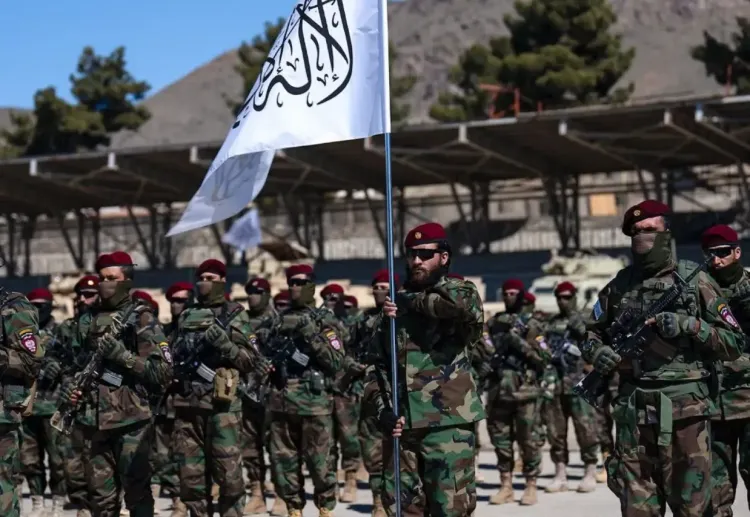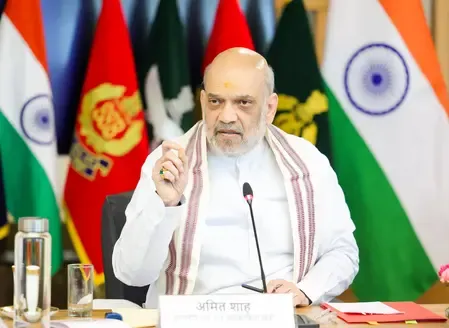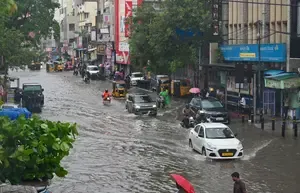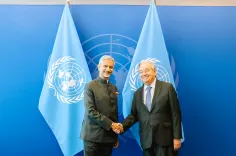Is Pakistan's poison finally coming home to roost?

Synopsis
Key Takeaways
- Pakistan's historical animosity towards India has now backfired, leading to its own turmoil.
- The Taliban's rise against Pakistan signifies a shift in regional dynamics.
- Human rights violations against Afghan refugees highlight Pakistan's repressive measures.
- The international community's silence raises questions about accountability.
- The unfolding conflict serves as a moral reckoning for all involved.
New Delhi, Oct 19 (NationPress) There exists a peculiar sense of fulfillment -- almost poetic justice -- in witnessing Pakistan face turmoil at the hands of Afghanistan. Some may label this sentiment as sadistic, but as Chanakya aptly articulated, “The enemy of my enemy is my friend.” For India, long subjected to Pakistan's animosity and deceit, this unfolding scenario feels like history rectifying itself.
Since its inception in 1947, Pakistan has vigorously pursued a path of hostility against India -- engaging in wars, inciting terrorism, and supporting actions contrary to India's interests. Now, as it enters its 78th year, the nation finds itself ensnared in the very chaos it has inflicted upon others. The Taliban, once its ally, is now turning against the Pakistani Army.
Social media platforms are inundated with footage of Taliban fighters humiliating Pakistani soldiers, setting their camps ablaze, and showcasing captured uniforms as trophies. These visuals not only depict battlefield humiliation but also reflect the profound animosity Afghanistan harbors towards Islamabad -- a nation that has exploited it for decades under the guise of strategic depth.
As per usual, when confronted with setbacks, Pakistan's fury has been directed at the vulnerable. Its Army, having struggled to suppress the Taliban, is now targeting innocent Afghan refugees within its borders -- demolishing homes, assaulting civilians, and even denying children access to education. Such actions are reprehensible, yet human rights organizations that typically raise their voices on smaller issues involving India have opted for silence.
The Pakistani establishment has a longstanding record of victimizing the innocent. During Operation Sindoor, when Indian precision strikes neutralized Pakistani-backed terrorists, the Pakistan Army retaliated by shelling civilian areas in Jammu and Kashmir. Over 25 Indians lost their lives, around 50 were injured, and places of worship -- including a temple, a gurdwara, and a mosque -- were damaged.
Ethical considerations have never been the forte of the Pakistan Army. For decades, it has operated terror camps, stoked sectarian tensions, and provided refuge to some of the world's most infamous terrorists. Osama bin Laden, the architect of the 9/11 attacks, lived undisturbed in Abbottabad for years until his elimination by US forces. Dawood Ibrahim, India's most wanted criminal, continues to find sanctuary there, even as Pakistan denies his existence.
Pakistan's moral decay was poignantly captured in the film 'Border'. In one scene, an Indian soldier offers water to a gravely injured Pakistani. Instead of accepting this act of kindness, the Pakistani attempts to stab his rescuer. The Indian soldier, embodying dignity and restraint, chooses not to retaliate. This contrast encapsulates the character of both nations -- humanity versus hatred.
This moral distinction was again evident during Operation Sindoor, when the Indian Army neutralized terrorists without harming a single civilian. In contrast, Pakistan deliberately targeted civilians in retaliation, highlighting the difference between a professional military and a terror-driven entity.
Meanwhile, Afghanistan has reached a tipping point. The Afghans, long subjected to Pakistan's manipulation, are now asserting their autonomy. Few could have anticipated that the Taliban -- nurtured and supported by Pakistan since the 1990s -- would one day confront its benefactor.
The Taliban first emerged during the civil war following the Soviet withdrawal, seizing Kabul in 1996 and imposing a strict, ultraconservative version of Islamic law. That regime persisted until 2001, when a US-led invasion dismantled it in the aftermath of the September 11 attacks. Pakistan's duplicity during this era -- supporting the Taliban while masquerading as an ally to the West -- turned Afghanistan into a villain, while the true puppet master hid in Rawalpindi.
When the Taliban regained power on August 15, 2021, Pakistan rejoiced. The generals in Islamabad envisioned turning Afghanistan into a puppet state and relocating their terror networks there. However, they miscalculated. Afghans, fiercely proud of their sovereignty, have refused to succumb to Pakistani dominance.
Afghanistan's Foreign Minister, Amir Khan Muttaqi, succinctly articulated this during his visit to India: “The Soviet Union came and was defeated. Troops from over 50 nations arrived with the US and NATO -- there was fighting for 20 years -- and now Afghanistan is independent and standing on its own feet.”
This reality is precisely what Pakistan's establishment cannot tolerate -- an independent Afghanistan, thinking freely, and rekindling ties with India.
Unable to accept Afghanistan's desire for independence, Pakistan has reverted to its default mode -- violence. It has bombed Afghan border cities, resulting in civilian casualties, including women, children, and even cricketers. True to its pattern, Islamabad is attempting to twist the narrative, blaming India for the rising tensions.
The silence from the international community is striking. Despite overwhelming evidence, few global powers have condemned Pakistan for its cross-border aggression. Yet, the facade is beginning to crumble. Pakistan is being exposed as a terror-producing nation that has long sought to undermine the peace of South Asia.
For India, this moment brings a sense of grim amusement. The nation that once weaponized extremism to destabilize others is now being engulfed by it. The poison Pakistan has spread for decades is corroding its own structures.
The escalating conflict between Pakistan and Afghanistan transcends a mere regional scuffle -- it stands as a moral reckoning. It highlights the perils of nurturing extremism for political gain and the inevitability of karmic justice. Pakistan's deep state may still cling to denial, but reality is fast encroaching.
As Afghanistan strives to reclaim its dignity and independence, with India watching from the sidelines, one truth is unequivocal: those who cultivate hatred and terror inevitably become victims of their own creation. Pakistan's long history of duplicity and violence has come full circle -- the poison it concocted for others is now wreaking havoc on itself.
(Deepika Bhan can be contacted at deepika.b@ians.in)









